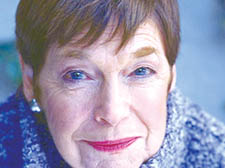|
|
 |
| |

Katharine Whitehorn laments the current state of feminist journalism |
Whitehorn’s memories are a woman’s own
Writer Katharine Whitehorn’s autobiography recalls her journey to Fleet Street and reveals some uncompromising opinions,
writes Gerald Isaaman
Selective Memory. By Katharine Whitehorn. Virago £18.99.
THE title of Katharine Whitehorn’s book comes from a quotation by Jim Fiebig, the American gemstone jeweller. And it fits perfectly, particularly if you are a journalist of Katharine Whitehorn’s distinction and have lived a life surrounded by facts galore and mountains of paper.
Fiebig said: “If you can look back on your life with contentment, you have one of man’s most precious gifts – a selective memory.”
And not only does Whitehorn accept the innate irony, but also its practicality. Indeed, the mind always plays its tricks and we automatically forget or falsely remember the troughs and triumphs of the past. Despite being a feminist crusader, she still omits her date of birth from Who’s Who, which ought not to matter now that she is a dedicated granny.
And she considers herself lucky, all the more so as her left-wing parents never dithered when it came to giving her a university education, providing her with the talents needed to make the grade as a columnist of wit and selective wisdom.
“The book is as revealing as I could bear to make it,” Whitehorn admits. There was always too much stuff from the past – old letters, articles, old bits of this and that all in boxes. I had it out all over the floor and it took me a week to get it back into boxes.
“One of the reasons I am a cheerful person is that I’m quite good at forgetting the occasions when people have been horrid to me. One or two I remember, like the awful people at The Observer who stopped my column.”
Whitehorn contemplated writing an autobiography “one day”, but had to wait until she could deal with the grief over the death of her husband, the immaculate thriller writer Gavin Lyall. They read every comma of each other’s prose.
“It would have been too gut-wrenching,” she insists. “Then I suddenly wanted to do it because it was a lovely way of living one’s life all over again.”
Nevertheless, she hit Gavin at least once when he complained she was a bad mother to their two sons, failing to recognise that her hectic life, which including sitting on the boards of major companies, helped to bring home the bacon while he, too often, hit the bottle while contemplating his wizard plots.
So she begins by fleeing from Roedean girls’ boarding school in Brighton, before buzzing off to Finland with the British Council to teach English, then to Cornell University in America and finally plunging into journalism writing for Home Notes, sub-editing Real Life Love Notes.
Picture Post, Woman’s Own and a column called Roundabout in The Spectator put her on the prose path, producing her most celebrated book, Cooking in a Bedsitter in 1960, based on a spell living in south London, which was still in print 40 years later.
It was at The Observer that she made her mark. Indeed, she begins her book by quoting herself from an article on “sluts” she wrote in the 1963 – “Have you ever taken anything out of the dirty-clothes basket because it had become, relatively, the cleaner thing?” – during a time there that lasted until 1996.
Yet again Whitehorn considers herself lucky to have been under the tutelage of George Seddon.
“He invented all these women’s pages that aren’t women’s pages and doesn’t get the credit,” she declares. “He knew how to grow a journalist.”
She names Mary Stott at the Guardian as the creator of the revolution in women’s journalism, something Felicity Green at the Mirror called the feminisation of Fleet Street.
Whitehorn says: “The Polly Toynbees, Libby Purvises and the Katharine Whitehorns got that way because somebody required them to be intelligent.”
Today, alas, she mourns: “I think The Observer Woman (magazine) is the dregs. It is really right back to, ‘We’re interested only in sex and clothes and make-up. I don’t think it crossed the minds of any of early feminists that women columnists would become laddettes.”
However, she doesn’t accept the pessimistic view that the world is doomed, a view she fears held mainly by the older generation.
“You struggle between the desire not to keep groaning away and feeling that things are fairly awful, but that is what older people do,” she confesses.
“Whatever we did feel when I was growing up before the war, we didn’t have knives on the street. It is terribly worrying now that I have got teenage grandchildren.”
For 40 years she has lived in an attractive road within walking distance of the Tube at Chalk Farm. Surprisingly, she views Hampstead as a home of irrepressible protest – middle-class people bursting at the frontiers of local authority order.
She abhors Tony Blair as “a complete Thatcherite, Brown not much different,” and castigates women MPs for being “much too anxious to be liked”. But then she says of Thatcher: “We really did need that bloody women.”
Contradictions accepted, Whitehorn stands out proudly as someone good to have as a rock-solid friend, and as a remarkable survivor whose remaining ambition is simply stated.
After being the agony aunt of Saga Magazine, which she rejects as demeaning, she says: “I have my eye on Rose Hacker’s slot on the Camden New Journal!”
 |
 |
|
 |
 |
|
 |
|



